Mixing Millennials and Baby Boomers in the Workplace Melting Pot
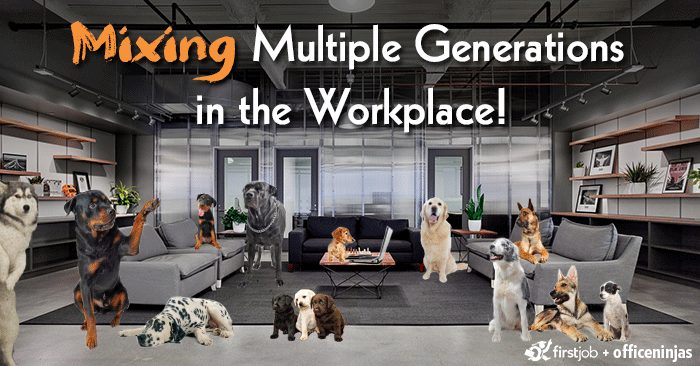
Editor’s Note: This article written in collaboration with FirstJob, a job site that matches recent college graduates with quality entry-level and internship opportunities.
According to Forbes, the average office environment now houses up to four generations under one roof, including Veterans (born before 1946), Baby Boomers (1946-1964), Generation X (1965-1979), and Millennials (1980-2000). Today, the old dog and the young pup needs to work harmoniously in order to get things done. These totally different generational viewpoints and approaches to work can undoubtedly be beneficial. But, they can also be somewhat challenging to navigate.
There’s one thing to keep in mind as we dig into this, and Office Ninja Emily V. put it just right, “While generational characteristics may be nice to know, in terms of how to handle training and how to get people more involved on a project, it is still a ‘stereotype.’ […] Characteristics will never apply to everyone and you risk alienating good workers by making assumptions.”
We’ve partnered with FirstJob to not only examine what these different generations bring to the table, but also how their differing sets of skills can blend to build a collaborative, well-rounded staff. Let’s jump in and take a look specifically at Baby Boomers and Millennials—two prevalent, yet consistently changing, generations in today’s labor force.
What Baby Boomers Bring to the Office
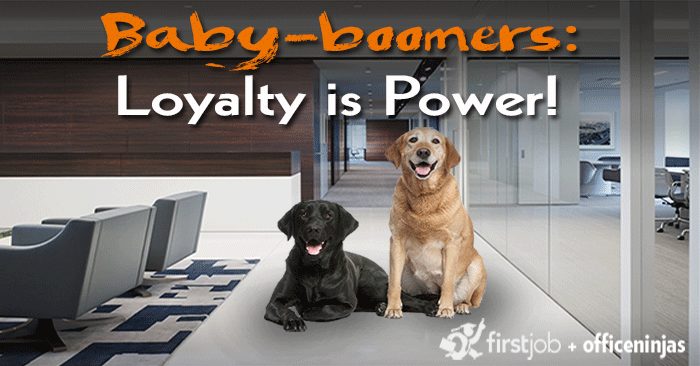
I think it’s important not to stereotype and learn each person’s thought process. For instance, I am GenX, but I probably have more in common with the Boomers. I am not against or scared of change or technology, but I don’t use a lot of it. I am probably still scarred from working in DOS systems and Word before there was an “undo” button. I’m all about the “human factor”. ” – Melissa S., Virtual Assistant
“I think it’s dangerous to assume the older generation just doesn’t understand,” says Austin Marshburn, Head of Marketing at FirstJob, “In general, most thoughts have been had by someone else before.” Which is exactly why it’s important to remember that their input and expertise are eternally valuable in the modern workplace.
So, what are some general characteristics of Baby Boomers?
- Productive, hard-working members of their organizations—according to a study published by Ernst and Young LLP
- Very loyal to their company
- Willing to put in long hours to get the job done, as this generational chart shows
- Skilled team players who like to feel valued in their organization
- Capability of breaking large projects down into smaller, more manageable sections and delegating those appropriately.
- Communicate in a direct and diplomatic fashion
- Prefer to have conversations in person
Loyalty is big among Boomer workers. “Millennials could learn a lot from older employees about what it’s like to stay with a single company. Jumping around is a lot more common today,” explains Braydan Young, FirstJob’s Director of Business Development. In fact, recent research shows that 91% of Millennials anticipate staying at any given job for less than three years.
What Millennials Bring to the Office
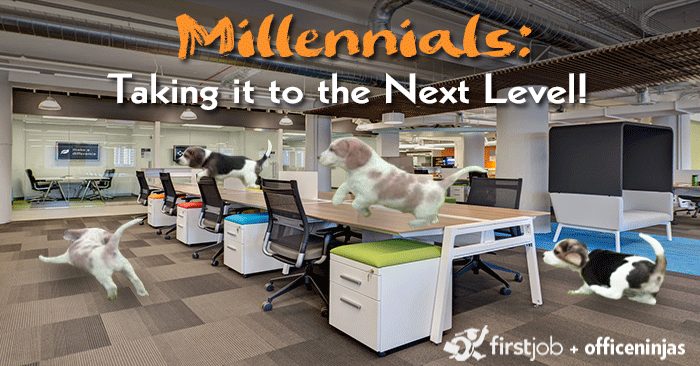
As an employee of a large private university; I work with individuals in all demographics. In my work unit, we have a mix of generations that work well together. We are a small staff so we must be accepting of one another. There are some ways millennials have of approaching the work day (i.e. arrival and departure times), tasks (deadlines) and work that are different from mine. However; I don’t think it is simply generational, but also individualistic, as well. Earlier generations were raised differently, and more rigidly (follow and do not deviate from the set standards) than millennials, and therefore are not as fluid in approaching work processes.” -Karen S., Administrative Assistant
Millennials are often talked about as if they’re an entirely new breed of humanity. As a Millennial myself, I can assure you that we still put our pants on one leg at a time (no, there’s no app to do that for us… yet). But Millennials definitely do have some different perspectives and approaches when it comes to work.
What exactly are those different perspectives?
- Extremely open-minded and excited about their career opportunities
- Exceptionally goal-oriented and great multi-taskers—according to LinkedIn
- Skilled collaborators who crave open, honest relationships with managers
- Desire to genuinely enjoy their jobs, as well as the people they work with
- Incredibly tech-savvy, with an innate understanding of how to leverage technology solutions
- Rely heavily on digital means of communication
- Believe important messages should be conveyed in person
“Millennials tend to walk in with an open mind,” shares Young, “They want to help solve the problem the company is trying to solve. They also really share a desire to progress in their career quickly”.
Of course, we couldn’t chat about Millennials and not mention technology. “Millennial culture is pretty varied, but there is one constant,” shares Marshburn, “Millennials intuitively understand any sort of communication tool and can translate that into an opportunity for their company to sell, advertise, or market, pretty easily.”
Young Pups and Old Dogs: A Winning Combination
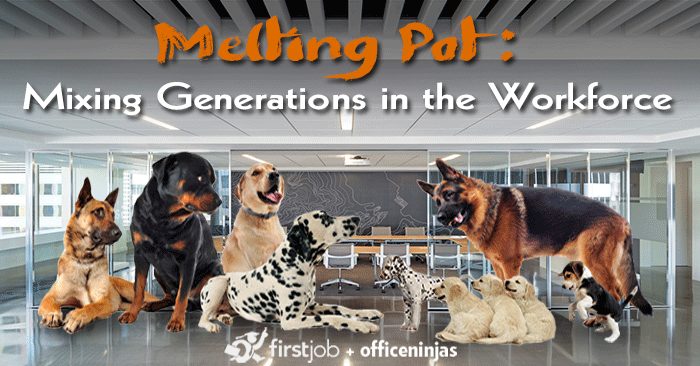
There’s no doubt that combining these differing philosophies and approaches in the workplace can be a bit of a challenge. However, mastering the balance of generational differences in your organization can yield some impressive results. As they say, “Differences make the world go round.” So, finding a way to respect and effectively utilize these different perspectives is key for a successful, well-rounded workplace.
First things first, it’s important to recognize that both generations have a pretty big thing in common: they both want to be shown respect. Baby Boomers crave respect and acknowledgement from younger workers, and Millennials feel they deserve recognition in the workplace—regardless of their age or level of experience.
Beyond that, Millennials and Baby Boomers can complement each other well in a work setting, filling in the gaps to create a diverse and accomplished team. For example, Millennials who are new to the workforce will require a certain amount of direction and supervision. Baby Boomers, who are exceptionally skilled at delegating assignments, can easily fall into this role and provide instructions to their younger counterparts.
The beneficial relationship between Millennials and Boomers is definitely a two-way street. Since the older generation is committed to working long hours, they could learn a thing or two about effective work/life balance from Millennials. The younger generation tends to look for jobs that allow them adequate time to maintain a healthy social life as well as pursue their other passions. Additionally, Boomers can receive some lessons on successfully leveraging technology from younger employees in their office.
Encouraging Office Harmony
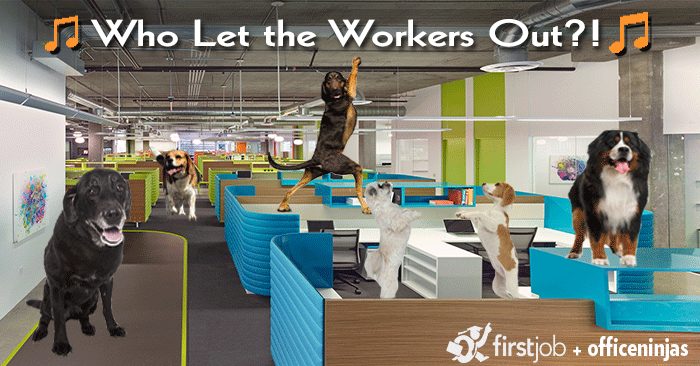
So, what can you do to encourage successful mingling and beneficial working relationships between these very different groups of employees?
“There is no substitute for creating an open workspace that fosters open communication among employees and is carried out without prejudice of what one’s job title is,” explains Marshburn, “This creates transparency and allows everyone to feel like they have a stake in the direction of the company. Moreover, it forces both sides to see and come to grips with the other’s viewpoint.”
“A mentorship program between older and younger employees is another effective way to have the two groups work together and openly communicate,” adds Young. Plus, they’ll get the bonus of having a one-on-one office relationship that they can leverage in order to learn new skills and expand their horizons.
Executive Assistant, Cindy B.’s company takes it a step further, “Our company is pretty well split between a more mature workforce and the younger generation. They offer programs and events that appeal to everyone (who wouldn’t want to attend the beer bash?) and try to be inclusive of all groups.”
It’s no secret that different generations can have contrasting views on work. But, it doesn’t need to be a sore spot filled with conflict and disagreement. Foster a work environment that respects and values differences—rather than downplaying or punishing them. For example, identify methods of communication that work for all generations, or set a meeting schedule that fits well with all schedules. Focus on these things, and you’re sure to have a successful, well-rounded, and harmonious office!
Does your office boast a combination of different generations under one roof? How do you encourage open conversations and cooperation?
Thank goodness for the Millennial’s and Gen X’rs!! If it weren’t for them…us Boomers couldn’t retire and get our Social Security!! Keep up the excellent work!! ;-)
Being a Boomer, I am of the opinion the company will always come out on top when it comes to my time. It is very difficult to sit back and watch millennials take from a company. To them, it’s about doing my job in the least amount of time so I can leave early and still be paid for my 40 hours. Doesn’t work for us boomers, folks. Figure it out. 40 hours of pay for 40 hours of work. It isn’t rocket science, but it IS common sense, common decency, and respect. End of story.
The dogs analogy this articles presents is not accurate.
I am in IT and boomers are expected to have a static level of knowledge while the rest of us are the solution to the challenges they are leaving us. Articles states “boomers are productive.” NO, they only know one or two obsolete computer languages and no new technologies while we have to know anywhere between 15 and 20 recent languages and all new technologies. Why do boomers fight our project completion estimates when never done it?
Asking younger generation to learn to “code” is not the direction we need. What if younger generation feels we are forcing them to learn the skills boomers do not want to learn?
We have to bring ideas at a fraction of a boomer salary and they are so busy competing and discussing their 401k, their pension, their stocks, their vacation homes, their rental properties, how impressed their financial advisers are with their portfolios, their health, their diet, their Dr. appointments and etc…
Let us be realistic, boomers are the ones in control, both public and private sectors, and we are the ones providing solutions to the problems they created; yet they blame Millennials for everything. Let us not fall into that fallacy.
Raising hand! I am one of them. I think we are the blessed generation(X) as we have the equal balance of tech savvy and social conscience (millennials) and the personal touch and work ethic (boomers).
I work with a millennial’s and what I have noticed is they don’t respect older employees who have been there for many years. They don’t understand office etiquette! Like no you can’t leave early if not everyone has gone to lunch, especially if you help in the office answer phones and the front door. They are in a bubble and working in an office is a team effort. They have many tasks, but only do the one they think is most important. They don’t think to help out others..unless it’s the boss and they are kissing..A$%. They don’t understand to fill paper in copier, coffee if they take last cup and try learning from long timers instead of thinking they know EVERYTHING because they just graduated college!
The Healthcare industry has not been exempt from this theory. I work in an environment where three generational groups are tasked to work collaboratively. The problem is real between the work styles, not ethics. As a Healthcare Manager I have to manage this diverse group has been a challenge but what I have done is assign task according to work styles and necessity.
Great article.
Its funny how people discuss about MIllenials and baby bloomers as if there was only the occidental culture, and while that Indians that are all foccused on job, that leave their pesonal lives at home(what we all should do except for really emergency things),that are supported by the goverment to adapt every new tech that are realeased, are taking almost all tech jobs around the world.
Habits stay generations,principles stay for the whole history.
I thinks that is the intention behind the neuroscience researches,try to make”millenials” and those who came after than understand that while theyŕe at work they should work, before the occident loses completely its leadership to orient.
Can you list one technology that Millennials can bring to a corporation that they don’t already use at the highest level? You can’t. Actually, one of the complaints of Millennials by older management is that many lack specific software skills and are slow to adapt to the new.
You are more dependent on it for your social life, but you are not more savvy with it in business. Millennials didn’t invent tech, it’s been around way before you got out of grammer school. Every company is proficient at it these days. It’s called the “law of years.” They have departments that are dedicated to be on top of the latest tech of any nature. Time is money.
Very narcissistic and naive to think otherwise.
I understand your viewpoint but specific software that is developed for a particular company is not something a Millennial is going to have inherent knowledge of. The point the article is trying to make is we have grown up with technology growing with us and are more inclined to adapt to it faster than someone who has been working on an ancient software that their company refuses to upgrade because it is too costly and won’t create much more efficiency. This is not always the case, sometimes the software keeps up with the times but I guarantee you a Millennial will pick it up faster than another older counterpart who has the same lack of familiarity with it. Also, it’s grammar, not grammer. Maybe that was intentional on your part…. Not sure.
While there are valuable points to be gleaned in articles like this, there are three generations in most work forces today Not even mentioning the generation between Baby Boomers and Millennials is a large oversight as they have a distinct voice and their own contributions to add to a cross-generational workplace.
That’s very true, Alyssa. While we touched on the fact that there are also Gen Xers in the workplace, for this specific article, we wanted to narrow the focus to just two of the groups. However, it would be very interesting to approach the topic of Gen Xers and how they fit into the workplace dynamic. If you’re open to sharing your own personal insights with me (or know someone who would), I’d love to hear what you have to say. You can email me at: dinah@officeninjas.com
Alyssa,
I agree–we actually have four generations in the workplace (especially when we have interns)! There are still some of the younger Silent Generations working (they’re 70ish now); and we have a full phalanx of Baby Boomers, GenX, and Millenials. (I prefer the Strauss & Howe division of generations–it keeps each generation to 20 years and correctly places me in GenX–or GenJones–instead of the Baby Boomershttps://en.wikipedia.org/wiki/Strauss%E2%80%93Howe_generational_theory).
I think that a follow-on article which looks at GenXers and how they work sandwiched between Baby Boomers and Millenials would be interesting.